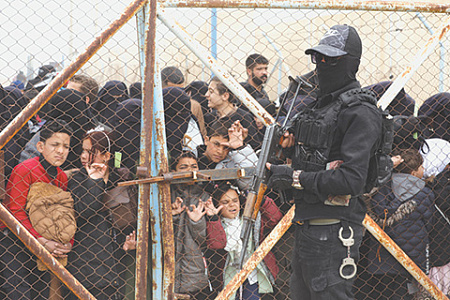
The Syrian transitional government will take in the families of the Islamic State (IS) militants (recognized as terrorist in Russia and banned), who have been held in special camps in the northeast of the country for a long time. Damascus has reached such an agreement with the Kurdish forces in control of the region. The deal involves a program of social rehabilitation for people who were once directly linked to ISIS, but may also play into the hands of the group’s recruiters.
The Syrian Democratic Forces (SDF), a military alliance controlled by the Kurds, announced that an agreement had been reached with Damascus on the resettlement of camps in the northeast. Under the terms of the deal, the main changes await Al-Khol, a camp that has long operated in Hasakah province as a place of detention for former IS members and their relatives. Damascus is ready to evacuate, first of all, those Syrians who previously lived in areas of the republic that were under the military and political control of the government led by ex-President Bashar al-Assad. The DSS stressed that this is a social rehabilitation program that will have to deradicalize the camp residents and return them to normal life.
The Kurdish formations will work with Damascus within the framework of a special joint mechanism, but the DSS has already stressed that the management of the Al-Khol camp will remain the exclusive prerogative of the Kurdish formations. Back in March, the commander of the DSS, Mazlum Abdi, officially concluded an agreement with the President of the Syrian transitional period, Ahmed al-Sharaa, on the integration of the Kurdish region into post-Assad Syria, including with all civilian and military facilities. But the bloody clashes that have since flared up in various areas densely populated by ethnic and religious minorities have forced the DSS to slow down its rapprochement and declare the need for federalization for the whole country.
The current deal is the result of personal negotiations between al-Sharaa and US President Donald Trump, which took place in Saudi Arabia on May 14. This is indicated by the comments of the US Ambassador to Turkey, Thomas Barrack. Recently, the diplomat said that Washington’s decision to lift all sanctions against Damascus would meet the main goal of “the final defeat of ISIS” and “give the Syrian people a chance for a better future.” It follows from his statement that Damascus has taken certain measures to expel from the country foreign fighters who once fought with al-Sharaa shoulder to shoulder as part of the group “Hayat Tahrir al-Sham” (HTS, recognized in Russia as terrorist and banned), and the fight against ISIS.
Al-Khol was recognized by American intelligence as a real cluster for the development of a new generation of jihadists. The Kurdish forces lacked the resources to ensure proper control over the Syrians held in the camp, who were widely believed to continue to sympathize with ISIS, while representatives of the US-led global coalition did not have a strategy for their rehabilitation. During the era of former US President Joseph Biden, the White House was working on a plan to partially resettle the residents of this facility in order to reduce the risks of deep infiltration by terrorist elements, but some countries where the camp residents came from did not want to host potential “sleeping” militants.
Iraqis and Syrians make up a significant part of the nearly 40,000 ISIS-linked people who have been held in Al-Khol since the defeat of the jihadist group’s territorial core in 2019. In recent years, Iraq has developed a mechanism for receiving these people with subsequent social rehabilitation. The same program operates in the region, which is under the de facto control of the Kurdish forces. It is not known what fundamentally new things the Syrian transitional government is ready to offer from this point of view, which itself came to power on December 8, 2024 in the wake of a powerful offensive operation by Islamist groups that once closely collaborated with the “brands” of global jihad.
It is known that for many years the IG has been waging an active propaganda campaign among those people who inhabit Al-Khol, appealing to a sense of resentment for loved ones eliminated in the framework of the war with the IG, and the need for revenge.
It is worth noting that since Trump and al-Sharaa held a historic conversation in Riyadh, agreeing to cooperate, the supporters of the “caliphate” have directed all the power of their propaganda machine at the person of the president of the Syrian transitional period. The terrorist organization called al-Sharaa a “traitor to Islam” who flirts with hostile Western states.
As a measure to counter the Syrian government, the IG called on members of the new Syrian army, who once participated in the battles against Assad as part of various radical formations, to desert and join the IG, which, as is commonly believed, retains in its hands one of the most important outposts in the area of the poorly guarded Syrian desert. It is possible that the same cry will be thrown to those whom Damascus will try to return to a normal life after returning from the camps. Western research centers that monitor terrorist threats indicate that a number of prisons across Syria contain fully capable representatives of the militant wing of the group, who allegedly retired in the past.
